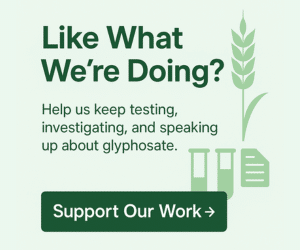“If the company is claiming glyphosate doesn’t cause cancer, prove it in a court. Don’t go to the Legislature and buy immunity.”
Those words from Amy Gunn, a trial attorney who has fought Roundup cases in the U.S., cut right to the heart of the matter. They capture in one breath the frustration felt by communities, farmers, consumers, and cancer patients worldwide: if Bayer truly believes glyphosate is safe, then the courtroom — not the halls of Parliament — is the proper place to prove it.
Instead, what we see again and again is an effort to quietly change the rules of the game. And in Missouri, where Bayer’s U.S. headquarters are based, the company has been lobbying hard for legislation that would limit or even remove its liability for Roundup-related cancer claims.
Bayer’s U.S. Push for Glyphosate Immunity
According to reporting by the St. Louis Post-Dispatch, Bayer and its allies have pushed for new laws that would block plaintiffs from bringing future cancer cases against the company. This comes after Bayer has already agreed to pay more than $10 billion in settlements, while still facing thousands of pending cases.
It’s a remarkable strategy. If Bayer were truly confident in the safety of glyphosate, one would expect them to welcome courtroom battles, present the evidence, and let juries decide. Instead, they are pouring their energy into political maneuvering — closing off the path of legal accountability before it can reach them.
That’s not science. That’s self-preservation.
Update: Bayer’s push for legislative immunity in Missouri ultimately failed — lawmakers did not pass the liability shield the company wanted. Instead, the courts proceeded as they should. In September 2025, the Missouri Supreme Court refused Bayer’s appeal, letting a US$611 million Roundup cancer verdict stand.
In other words: the legal system did exactly what Bayer was trying to avoid. The evidence was tested. A jury weighed it. And the company was held accountable — no legislative shortcut required.
Why Glyphosate Accountability Matters More Than Immunity
The courtroom is where evidence is tested. It’s where experts are cross-examined, documents are made public, and the public record is established.
By contrast, legislative immunity is the shortcut that ensures those uncomfortable questions never have to be answered. It bypasses not only plaintiffs but also the public’s right to know.
History has shown us this pattern before. Tobacco companies once sought legal shields when the evidence turned against them. Opioid manufacturers, asbestos producers — the list goes on. When profits are threatened, lobbying often replaces transparency.
The principle here is simple: if your product is safe, you should have no fear of proving it in court.
The New Zealand Parallel: Glyphosate Rules and Regulatory Loopholes
You might wonder what a political fight in Missouri has to do with our situation in New Zealand. The answer is: quite a lot.
The strategy may differ in form, but the effect is the same. Here in New Zealand, we’ve seen regulators move not toward tighter oversight but toward loosening protections:
- MPI has proposed raising allowable glyphosate residues (MRLs) on staple food crops by up to 9,900%.
- The EPA has delayed and sidestepped decisions about glyphosate’s reassessment, citing the need for more information while allowing use to continue unchecked.
- No warning labels exist on Roundup sold in New Zealand, despite global concern and overseas lawsuits.
This is not a coincidence. It is another way of creating de facto immunity for industry. Instead of defending glyphosate in a transparent forum, rules are shifted to keep the product on shelves and regulators off the hook.
It may not happen in a courtroom, but the logic is identical: avoid accountability, keep the sales flowing.
And the same dynamic is visible here in New Zealand — not through courtroom maneuvering, but through regulatory decisions that quietly shift the balance toward industry.
What’s at Stake for New Zealanders Exposed to Glyphosate
Behind every lawsuit, every residue test, and every consultation submission is a human story. These aren’t just corporate balance sheet issues. They’re about people living with cancer, families losing loved ones, and communities eating foods laced with a chemical they never chose.
Here in New Zealand, our independent tests have already found glyphosate in honey, Weet-Bix, and supermarket cereals. Bread and oats are next in line. The exposure is real, and it begins far earlier than most people realise, even before birth, passing through what should be the most protected stages of life.
If Bayer is confident in glyphosate’s safety, why not prove it in open court — or at the very least, allow transparent, independent testing to continue without interference? Why instead focus on silencing lawsuits or shifting residue limits?
What New Zealand Can Learn from the Missouri Glyphosate Verdict
The lesson from Missouri is not just about one state or one company. It’s about the principle of who gets to write the rules: corporations, or the public.
In Missouri, Bayer’s push for legislative immunity ultimately went nowhere. Lawmakers let the proposal die, and the courts proceeded — upholding a US$611 million verdict against the company. New Zealand should take note: when corporations seek immunity, it’s rarely because the evidence is on their side.
Here’s what New Zealand should take from this moment:
- Accountability builds trust. If glyphosate is safe, Bayer and regulators should welcome scrutiny.
- Immunity erodes trust. Raising MRLs or ignoring warning labels signals to the public that the system protects corporations, not consumers.
- Precedent matters. If Bayer can buy immunity in Missouri, what’s to stop similar moves in New Zealand — not through courts, but through captured regulators?
Where This Leaves New Zealand on Glyphosate Regulation
Missouri showed what real accountability looks like. Bayer’s attempt to secure legislative immunity went nowhere, the courts were allowed to do their job, and a US$611 million cancer verdict was upheld. No shortcuts. No special protections. Just evidence tested where it belongs — in full view.
And here in New Zealand, we’ve now seen a partial retreat from MPI. The proposed 9,900% increases to residue limits on wheat, barley and oats will not go ahead. Only dry peas will see higher limits. It’s a welcome shift — a reminder that public pressure works — but it doesn’t fix the deeper problem.
Because the core issues remain:
- New Zealand still has no warning labels on glyphosate-based weedkillers.
- Regulators still haven’t tested the full formulations being sold.
- Independent tests continue to find glyphosate in honey, cereals, and bread.
- And industry still benefits from a system that bends far more easily than it scrutinises.
Which is why Missouri’s lesson matters here. When corporations seek immunity — whether through legislation, permissive residue limits, or regulatory loopholes — it’s rarely because the evidence is on their side. It’s because genuine scrutiny is inconvenient.
And so we return to where we began.
Amy Gunn’s challenge should echo beyond Missouri:
If the company is claiming glyphosate doesn’t cause cancer, prove it in a court. Don’t go to the Legislature and buy immunity.
Resources & References
Understanding glyphosate’s impact requires more than headlines and soundbites. It means looking at the legal cases, regulatory decisions, scientific concerns, and community stories that form the wider landscape. The sources below provide context that helps make sense of why this issue keeps resurfacing — and why the questions keep getting louder.
St. Louis Post-Dispatch — Bayer’s push for immunity in Missouri
Reporting on Bayer’s efforts to pass legislation shielding the company from future Roundup cancer lawsuits. Provides context for the immunity bid discussed in this article.
Missouri Independent — Missouri Supreme Court refusal to review US$611 million Roundup verdict
Coverage confirming that the Missouri Supreme Court declined Bayer’s appeal, allowing the historic judgment to stand.
Reuters — Bayer loses appeal of $611 million Roundup verdict in Missouri
Reliable international reporting on the appeals loss, demonstrating the strength of the court’s findings against Bayer.
Investigate Midwest — Bayer’s legislative immunity strategy
Explains how Bayer and other pesticide makers ramped up lobbying efforts across multiple U.S. states to limit legal exposure.
AP News — Roundup lawsuits and Bayer’s legal tactics
A national overview of Bayer’s ongoing attempt to limit lawsuit exposure while maintaining claims of safety.
MPI Announcement (30 October 2025) — MRL changes for wheat, barley, oats, and peas
New Zealand’s Ministry for Primary Industries confirming that proposed glyphosate residue increases for wheat, barley and oats will not proceed; only dry peas will see a higher limit.
NoMoreGlyphosate.nz — Independent glyphosate residue testing results
Our community-funded independent testing results show glyphosate in honey, breakfast cereals, Weet-Bix, and supermarket bread.
EPA New Zealand — Glyphosate Rules and Regulation
Information on EPA’s reassessment process and regulatory history for glyphosate in New Zealand.
FSANZ – Maximum Residue Limits (MRLs) in Food
Reference for understanding how MRLs are set and what changes mean for consumers.
Book Reviews on NoMoreGlyphosate.nz
Toxic Legacy — Stephanie Seneff
https://nomoreglyphosate.nz/toxic-legacy-stephanie-seneff-review/
A deep dive into the science and controversy surrounding glyphosate’s impact on our bodies and ecosystems. Seneff lays out why this chemical may be doing far more damage than regulators acknowledge.
The Monsanto Papers — Carey Gillam
https://nomoreglyphosate.nz/the-monsanto-papers-glyphosate-legal-battle/
Gillam exposes the internal documents, legal strategies, and corporate manoeuvring behind the Roundup cancer trials — revealing how far Monsanto went to protect its flagship product.
Whitewash — Carey Gillam
https://nomoreglyphosate.nz/whitewash-carey-gillam-monsanto-expose/
A compelling account of how scientific research was manipulated, critics were discredited, and public perception was shaped to keep glyphosate on the market.
Unstoppable — Zen Honeycutt
https://nomoreglyphosate.nz/unstoppable-zen-honeycutt-review/
A personal and inspiring story about confronting hidden toxins in everyday food, and how one parent’s determination sparked a movement for independent testing and greater transparency.
Taken together, these sources remind us of something simple: when evidence is scattered, accountability suffers. When the pieces are examined together, a very different story emerges — one that demands transparency, independent oversight, and a regulatory system willing to put people first.
Image Source & Attribution
We’re grateful to the talented photographers and designers whose work enhances our content. The feature image on this page is by Leonid_Eremeychuk.




